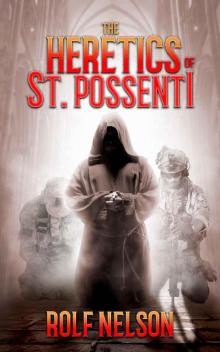- Home
- Rolf Nelson
The Heretics of St. Possenti Page 10
The Heretics of St. Possenti Read online
Page 10
Most appeared to be vets or came from hunting families, but others were amateur competitors, and a few simply enjoyed the sport for an afternoon. None were what he’d call poor; shooting cost real money, and it had to be “extra.” One man’s quick rundown on the cost-difference between factory ammo and reloading his own was very illuminating, particularly when he compared it to home-cooking food bought in bulk versus the cost breakdown when eating out. It had never even occurred to him that any part of a cartridge could be reused, let alone many times. He realized that using sourdough in his own rectory kitchen when cooking for the homeless could save on the cost of yeast; he wondered what other insights he might see if he keep asking enough questions.
The respect he saw the men with five-thousand-dollar rifles topped with three thousand dollars of glass had for guys shooting century-and-a-half-old black powder cartridges like the .45-70 with home-cast lead bullets was impressive; each recognized that the other had good points and bad, history, and utility. They made choices based on personal preferences, needs, and funds.
Suddenly, another six hours at the range had disappeared, and it was starting to get dark. So much to learn. So very much to understand. This was going to take a lot longer than Thomas Cranberry originally thought. But he also realized how satisfying it was to do something that was so surprisingly physical and difficult and to do it well.
On the drive home, he thought that the most uncomfortable feeling about the range was just how comfortable he’d been and how warm and welcoming the people he’d met had been. He was not unused to being wrong; he was unused to being so spectacularly wrong about something. Shooting was actually sort of fun.
* * *
As they reviewed what was seen and learned during the drive home, Mickey chuckled.
Thomas looked at him curiously. “What’s so funny?”
“You went for the bait, found the hook.”
Thomas gave him a blank look.
“The hook isn’t the bait. The bait is what draws you in. The hook is what keeps you in.”
“And…?”
“You came to see the bait, to explore the perceived power and authority, the seduction of firearms. And let’s face it, in many ways the gun IS the symbol of power, authority, and freedom. Cops have to turn in their badge and gun when they leave the force. Suspects have to surrender their guns when under investigation. Free men can own guns; slaves, prisoners, and subjects cannot. The hook for good men, though, is not just that it’s empowering. It is that shooting is just plain fun. And, to a degree, it offers greater responsibility and being entrusted with responsibility feels good. The bad people never see past the bait; the righteous recognize the both the fun and the potential downsides. They act better accordingly.”
“And you think you are going to turn me into a gunnie?”
“I saw the smile on your face at the first bullseye, Padre…. Ear to ear. You’ll be back to the range before long, my friend. You’ll be back.”
Inspiration
Bushido is all very well in its way, but it is no match for a .30-06.
—Col. Jeff Cooper
It was another late-night discussion after an inter-dojo sparring practice, with some of the regulars and a scattering of fresh faces.
Around 1 AM, one of them, an elderly newcomer, made a trenchant observation about the minimum required training time for a man such as himself to reasonably expect to be able to defend himself against a typical thug in his twenties. He compared the two weeks and once a month practice a pistol required versus three to five times a week for several years in any unarmed martial style, saying that was why he carried a pistol. Simple time and physical size constraints made it the only practical choice.
Mickey nodded sagely in agreement. “That’s why the gang-bangers like guns, too. Most aren’t very bright, and they’re seriously not into training. When you see someone with an attitude pointing a piece at you, you don’t—usually, anyway—have any idea if he’s good or just might get lucky because a hollow point in the wrong part of your anatomy can ruin your whole day no matter how big you are. Criminals respect that fact as much as they use it. They like that low-skill leverage. Rifles are easier to aim but still take some training and are harder to conceal. At longer ranges with rifles, though, it’s an almost Zen-like meditation to hit small targets reliably. But most criminals don’t want to think. They just feel the adrenaline rush. A great deal of mental focus is needed to be great, but you can learn to be effective enough fairly fast. Certainly faster than karate or whatever.”
In a flash, Cranberry saw the forest he’d been missing for the minute examination of the few trees he’d personally witnessed.
Walking to the pub from the dojo so many nights ago, he had felt totally safe despite the neighborhood and time….
Men are drawn to power….
Men are designed to commit and recover from physical exertion and violence….
The adrenaline rush of combat is exhilarating and motivating….
Weakness in men is a huge turn-off to sane women, financial weakness as much as physical weakness….
Group confession seems to be every bit as cleansing as private….
A healthy body is much more conductive to a healthy mind than a weak and unhealthy one….
Some men are inclined to run toward gunfire rather than simply awaiting fate….
Enforced passivity of body leads to passivity of mind and soul….
Visible symbols, whether cross or gun, are powerful things, because the images trigger cascades of related ideas and thoughts….
Humans are competitive and often like to talk to and work with a team of like-minded people….
Even men who tend to be followers hate a feeling of dependence or being seen as weak….
Mental health when surrounded by people who don’t understand you or what you have been through is very difficult to maintain….
Sometimes the best path is to start in a different direction than you wish to end up….
Only so much time to practice and develop a skill….
Bait versus hook….
The pieces all fit, and the image was clear enough, but shocking. It implied he still had a vast expanse of human knowledge to learn. And it was whole fields of study he had only glimpsed recently, not merely the sort of things he could find in a few quick web searches or the daily piecemeal research he’d been engaging in thinking he was having deep thoughts.
He leaned back in his chair, gazing up at the ceiling as the different conversations swirled around him. The fundamental concept was obvious, but the practical details were mindboggling. He sipped a beer—his third—and thought hard, not just free-associating as he’d been doing moments earlier. He considered practical details and consequences and funding requirements. To say it was a radical idea was an understatement. On the one hand, it seemed clear, useful, and, in retrospect, obvious. On the other hand, it was bizarre and unworkable and would be tap-dancing through an impossibly large number of doctrinal, philosophical, and cultural minefields. But… nothing ventured, nothing gained, and a better group to bounce such a woolly idea off of he couldn’t imagine.
He leaned forward and rapped his glass gently for attention. Talk died away, and they looked at him expectantly.
“Gentleman, I have an idea…. How many of you have learned something new here in the last week?” He raised his hand. Everyone else did, too. “Have you learned something worth passing on to at least one young man? Something useful or interesting?” Again, all hands rose. “That is my solution.”
The conversational silence was broken only by the background music until John spoke up. “You lost me there, Padre.”
“The solution to my missing-man problem. Really, it is our problem—the Church’s problem. Men are seeking what the Church is not offering.”
“Yeah. We know that. We’ve been telling you for weeks,” said John.
“But they want what we at this table, collectively, have; by training, exp
erience, or instinct. We need to make our skills and discipline available to them. All in one place. And not as an ending, but a beginning, the first leg of a long journey. The bait that will lead them to the hook.”
The faces around him showed keen interest, though none of their expressions lit with insight. At last John spoke again. “Still lost. Need you to spell it out. Or at least start droppin’ bread-crumbs.”
Cranberry pointed to Wang. “Your monks come and study, learning to master the spiritual as well as the martial arts, and they live a simple lifestyle. Some leave, but leaving is not considered failure, not as it is in the Christian monastic tradition.
“We will start a new order of Christian monks. A new type of monk, to meet a new need. A hybrid of monastic and chivalric orders and more. An order where we expect most will be with us for only a handful of years, then returning to the world, somewhat like friars. They learn to be better men: practical skills, skillfully wrapped in Biblical philosophy and scripture, but with a much harder edge. The order will make them tough. Physically tough. It will teach martial arts—like you, Master Wang—but also firearms and the self-restraint needed to be safe and effective with them.
“Get them off the street. Off drugs and alcohol. Out of debt. Give them food better than the shelter handouts they get now. Give them a squad of like-minded brothers-in-arms to work with—men they can trust. Train them in skills that will help get a good job and the mindset to keep it. Teach them better ways to handle women—or any relationship. Feed them: food for the mind and spirit, as well as the body.”
“So… an insane mash-up of seminary, boot camp, voc-tech, twelve-step program, dojo, sniper school, alpha-game club, and culinary arts diet seminar?”
“Exactly. And because it has a specifically religious affiliation, all the normal gender-equality and other affirmative action bullet-points these men complain about simply don’t apply.”
The group around him looked skeptical as they mulled the idea over. It was so over the top and unexpected, with so many ramifications, it took a little while to process, even for this crew. Most appeared to see it as an opportunity to munch on something and to see what the others thought first.
Vritra spoke up. “Okay, I see what’s in it for the young guy. He’s lost; you give him a roof, food, and something interesting to do for a while. Maybe a couple of years. Apologies for sounding much like my wife, but you said funding is a problem: how do you make money on this?”
“Obviously, it would need seed money to get going. Once up and running, the graduates would have jobs, and thus income to tithe with. And of course most monasteries are self-supporting; they make cheese, or wine, or other products to sell. They have some sort of traditional industry.
“This is a long-term plan, not a get-rich-quick scheme. But think! Young men getting a solid schooling in both the practical and the philosophical and needing ongoing training with your dojo or shooting ranges. They get their heads on straight, so they can have a girlfriend or wife without getting caught in the legal traps where lust will lead them. They will have a better chance to start a family, a family they will bring to church. Mix morality and practicality; they want to get laid, so we help them find a decent wife by teaching advanced and coldly realistic relationship skills, not the normal pabulum, but not just pickup-artist lines either.
“Is this not an opportunity you would have leapt at when you were twenty years old?” Thomas concluded.
“Sounds a lot better than my three wasted years wasted in college getting a degree in poli sci,” said Bill. “Lots of idealism there, but little reality and fewer jobs. Had to drop out and join the Army Reserve only to get activated. I’d have gone for your program. Hell, I’d go for it now. The wife would likely be happy if I were out of the house for a few years, too.”
“So would this program be open to anyone or only vets?” Mickey asked, trying to wrap his head around the plan. “I know a lot of non-vets that are pretty messed up, too, you know. And would the monks be allowed to be married? Either before or after? Later on they could become deacons, I’d expect.”
“And if they were married, would there be conjugal visits or a just dry spell for the duration?” queried Bill. “I suppose temporary annulments would be off the table.”
“What is the normal treatment for PTSD anyway?” asked Kainan.
The next couple of hours were filled with a much more focused discussion of what such a program would look like, both in theoretical and concrete terms. How much room in what sort of buildings, how much food, what sort of exercises, what kinds of martial arts, what specific scripture passages should be emphasized, and the plethora of considerations they’d need to account for before he said anything to anyone in the Church. It was a fast conversation with a lot of input, cross-talk, and serious consideration. Before long, most of them were taking notes as they talked.
* * *
There were eleven of them left in the room when Erika came back to tell them it was past closing time. Everyone else had left already, and cleanup was done. But after listening to them for a while, she double-checked the locks on the doors and joined in, offering her experience from the other side of the aisle and bar.
It was after three AM when she noted that if a guy could get through the program they were outlining, he’d likely be a guy worth marrying. Might even be the kind that could make her consider a somewhat more traditional marriage. “But,” she asked dramatically, “how to approach the archbishop with this plan? He wants a flock; you’re talking about creating a giant pack of sheepdogs who bear a pretty strong resemblance to wolves. There might be more than a little bit of turf-protection.”
“I suggest you lie,” said John, deadpan and articulating carefully. “Prodigiously. You were clearly inspired after a two-day fast and a marathon prayer session. Mumble something about self-flagellation, angels, and a flaming bush if you don’t think that’s pushing it. We could torch a left-over Christmas tree for you if needed.”
“What? You don’t think closing down a bar managed by a wayward Wiccan in an epic bull-session with a part-time shyster, a Shaolin Buddhist, a Sikh, a martial arts master, some gun nuts, and a bunch of drunks would instill confidence? Why on earth would you think that?” The thought put a smile on Erika’s countenance. “But I’d love to see their faces after they buy in to it if they ever find out.”
“This was an inspiration, John. It is just that the Lord works in mysterious ways,” replied Cranberry. “Though sometimes the ways are more impressively mysterious than others.”
Debt
The rich rules over the poor, and the borrower is the slave of the lender.
—Proverbs 22:7
It was another tough workout. Well, it was hard on Thomas anyway. He was finding that barbells had no special respect for clerical rank, and a 20-kilogram plate weighed more every time he lifted it as the gravity gremlins kept hopping on. Lifting weights that were pathetically small compared to what some of the men at the dojo could embarrassed him initially, but he did his best to accept it humbly and simply to treat it as a growth opportunity and to learn from those with more experience. He found that though the others in the dojo might joke and tease in a low-brow manner, they deeply respected real effort and improvement regardless of starting point and offered honest support, encouragement, and spotters as needed.
One day he lifted heavier weights to build muscle, one day he did reps or cardio to build stamina, and one day he did flexibility and speeds drills, occasionally watching John or one of the other instructors teaching new students simple blocks or strikes, sometimes being taught the same. Every time he was there he met new people, and he quickly had a bit of a reputation—the priest who was easy to talk to, not preachy, and really wanted to hear about new things, problem, relationships, and thoughts that people had on a whole range of issues. He made a rule—he didn’t want to turn discussions into arguments, so he’d make no more than three rhetorical questions or statements per topic. All others had to be
neutrally phrased and aimed at gathering accurate information and not push any particular point. He found it generally worked well.
Sometimes someone would ask him what he really thought, and his standard response was, “What do you think a priest would think,” and the responses were usually accurate enough, if not particularly nuanced.
He’d been coming for about three weeks when John sent a man over to talk to him while he was in the middle of another anemic military press. When he finished and set the weights down, the man introduced himself.
“Hi. Excuse me. John said that I might want to… Well, I’m Aaron.” He held his hand out.
“Glad to meet you, Aaron. I’m Thomas Cranberry. John thought you might want to talk to me?”
“Yes. Yeah, he, ah…” he glanced at the others couple of guys working out with speed drills and other exercises, decided they were alone enough. “I just told him I can’t keep coming. It’s a great place to unwind, burn off some steam, but I just can’t afford it. It’s not a lot, but with bills piling up, I just can’t justify it. He’s already giving me a big break in price, but…”
“I see. Well, I’m a priest, not an employer, but I’m a pretty good listener. I’d be happy to let you bounce your thoughts and problems off me. Let’s see if we can find a way to talk yourself into a solution.”
“Not sure what you can do about collections guys calling or the phone cut off.”
“You never know. This won’t be the first time I have given credit counseling. I know a little something about it. How about I lift while you spot and tell me about it?”
Twenty minutes and several sets later, the picture was clear enough, and bleak. Too many bills, too many bad choices, too much bad luck, too many medical problems, and too much bad advice in times past. He was now way over his head, and his job-skills were never going to earn him enough in the current economy. Even if he started doing everything right, there wasn’t any obvious way to do much more than slow the downward spiral of being on the wrong side of high compound interest unless something big was done.

 Insanity's Children
Insanity's Children The Stars Came Back
The Stars Came Back Back From the Dead
Back From the Dead The Heretics of St. Possenti
The Heretics of St. Possenti